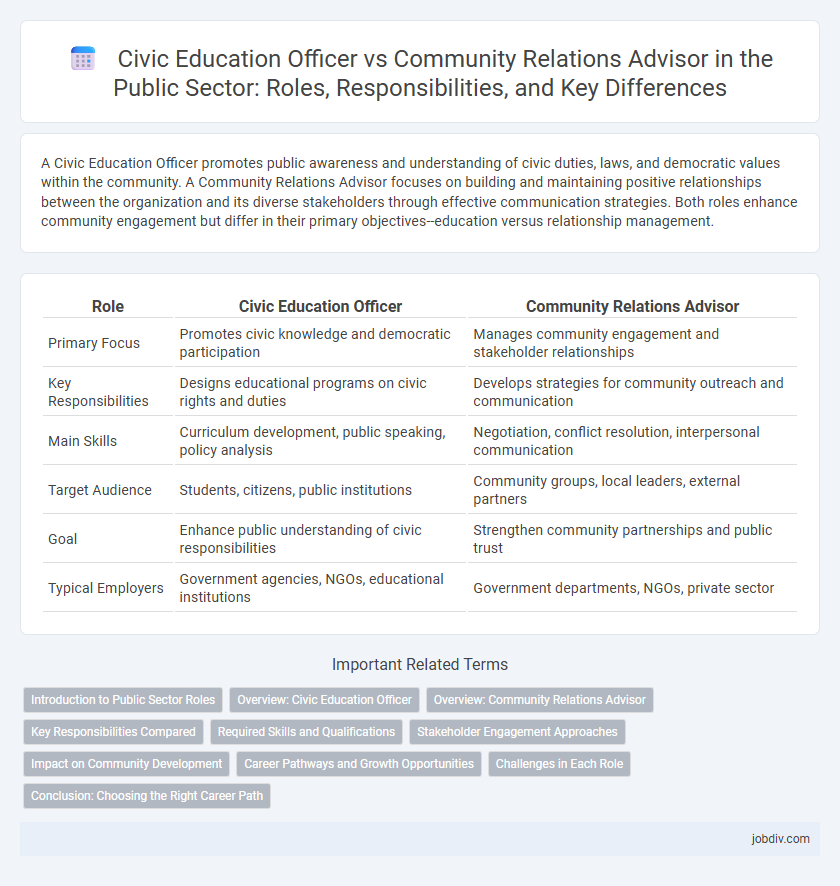A Civic Education Officer promotes public awareness and understanding of civic duties, laws, and democratic values within the community. A Community Relations Advisor focuses on building and maintaining positive relationships between the organization and its diverse stakeholders through effective communication strategies. Both roles enhance community engagement but differ in their primary objectives--education versus relationship management.
Table of Comparison
| Role | Civic Education Officer | Community Relations Advisor |
|---|---|---|
| Primary Focus | Promotes civic knowledge and democratic participation | Manages community engagement and stakeholder relationships |
| Key Responsibilities | Designs educational programs on civic rights and duties | Develops strategies for community outreach and communication |
| Main Skills | Curriculum development, public speaking, policy analysis | Negotiation, conflict resolution, interpersonal communication |
| Target Audience | Students, citizens, public institutions | Community groups, local leaders, external partners |
| Goal | Enhance public understanding of civic responsibilities | Strengthen community partnerships and public trust |
| Typical Employers | Government agencies, NGOs, educational institutions | Government departments, NGOs, private sector |
Introduction to Public Sector Roles
A Civic Education Officer primarily focuses on developing and implementing programs that enhance public awareness and understanding of civic duties and government functions. In contrast, a Community Relations Advisor specializes in fostering positive relationships between public sector organizations and community groups to facilitate effective communication and collaboration. Both roles are essential in promoting transparency and civic engagement within the public sector.
Overview: Civic Education Officer
A Civic Education Officer develops and implements programs that promote public understanding of government processes, democracy, and citizen responsibilities. This role requires expertise in educational strategies, community engagement, and policy communication to foster informed participation. Civic Education Officers collaborate with schools, local organizations, and government agencies to ensure accessible and impactful civic learning experiences.
Overview: Community Relations Advisor
A Community Relations Advisor specializes in fostering positive connections between organizations and local communities by developing strategic communication plans and managing outreach initiatives. They analyze community needs and feedback to enhance engagement and ensure alignment with organizational goals. This role requires expertise in stakeholder management, public relations, and conflict resolution to promote inclusive and sustainable community partnerships.
Key Responsibilities Compared
A Civic Education Officer primarily develops and implements educational programs to promote public understanding of civic rights and responsibilities, often collaborating with schools and community groups to enhance civic engagement. In contrast, a Community Relations Advisor focuses on fostering positive relationships between organizations and diverse community stakeholders, managing communication strategies to address community concerns and build trust. Both roles require strong communication skills, but the Civic Education Officer emphasizes educational outreach while the Community Relations Advisor prioritizes stakeholder engagement and conflict resolution.
Required Skills and Qualifications
A Civic Education Officer requires strong knowledge in political science, public policy, and community engagement, along with excellent communication and organizational skills to design educational programs. In contrast, a Community Relations Advisor must possess expertise in stakeholder management, conflict resolution, and public relations, supported by skills in negotiation and cultural sensitivity. Both roles demand a bachelor's degree in social sciences or related fields, with experience in community outreach and strategic communication highly valued.
Stakeholder Engagement Approaches
Civic Education Officers employ interactive workshops and public forums to educate stakeholders on civic responsibilities, fostering informed participation. Community Relations Advisors utilize targeted communication strategies and relationship-building initiatives to address community concerns and strengthen trust. Both roles prioritize tailored engagement to enhance mutual understanding and collaborative problem-solving among diverse stakeholder groups.
Impact on Community Development
A Civic Education Officer enhances community development by promoting awareness of rights, responsibilities, and democratic participation, fostering informed and active citizenship. In contrast, a Community Relations Advisor drives development through building partnerships, resolving conflicts, and facilitating communication between stakeholders to ensure cohesive community engagement. Both roles are integral, with the former focusing on empowerment through education and the latter on creating collaborative environments for sustainable development.
Career Pathways and Growth Opportunities
Civic Education Officers primarily focus on designing and implementing educational programs that promote civic engagement and awareness, with career growth often leading to senior roles in public policy or educational administration. Community Relations Advisors specialize in managing stakeholder communications and fostering partnerships, advancing toward leadership positions in public affairs or community development. Both career pathways offer opportunities for impact in public service, with Civic Education Officers emphasizing program development and Community Relations Advisors excelling in strategic relationship management.
Challenges in Each Role
Civic Education Officers face challenges such as effectively engaging diverse populations to promote democratic values and addressing misinformation that undermines civic participation. Community Relations Advisors often struggle with balancing varying stakeholder interests while fostering trust and collaboration in culturally diverse communities. Both roles require strong communication skills but differ in scope, with Civic Education Officers focusing on education and awareness, and Community Relations Advisors emphasizing relationship management and conflict resolution.
Conclusion: Choosing the Right Career Path
Selecting the right career path between a Civic Education Officer and a Community Relations Advisor depends on your passion for either educational outreach or stakeholder engagement. Civic Education Officers specialize in developing programs that enhance public understanding of civic responsibilities, while Community Relations Advisors focus on building and maintaining positive relationships between organizations and community members. Evaluating your strengths in communication, program development, and community impact will guide you to the most fulfilling and effective role.
Civic Education Officer vs Community Relations Advisor Infographic

 jobdiv.com
jobdiv.com